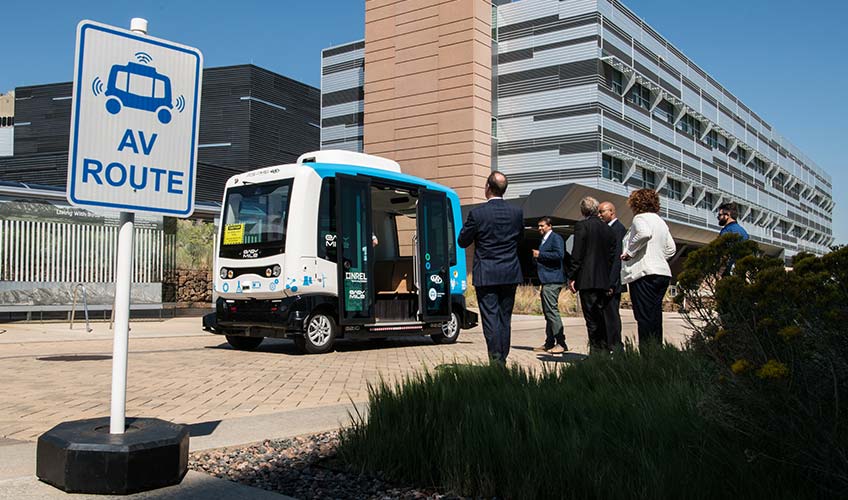Automated Electric Shuttle Makes its Debut on NREL Campus

The EasyMile automated electric shuttle took its inaugural ride around the NREL campus this week.
NREL’s intelligent campus ventures accelerated this week with the introduction of an automated electric vehicle in its employee shuttle fleet.
Designed to cover short distances and predefined routes, the fully electric EasyMile EZ10 shuttle took its inaugural ride on Monday, transporting staff and visitors around NREL’s South Table Mountain campus after a dedication ceremony marking its first day of operation.
Attending the dedication were NREL Director Martin Keller, Associate Laboratory Directors Johney Green and Julie Baker, and shuttle partners Jeff Womack of MV Transportation and Sharad Agarwal of EasyMile. The event drew local press from The Denver Post, CBS4, and the Golden Transcript, who interviewed Green as well as Kevin Walkowicz, manager of NREL’s Advanced Vehicles and Fueling Infrastructure Group, and Jeffrey Gonder, manager of NREL’s Mobility, Behavior, and Advanced Powertrains Group.
The automated vehicle serves as one of two circulator shuttles primarily transporting staff to and from the parking garage during peak hours. For the first year, onboard vehicle stewards from MV Transportation, the lab’s shuttle service subcontractor, will monitor vehicle operations to ensure safety.
The shuttle can carry up to 12 passengers and is designed to travel along a pre-programmed route. It is equipped with a full range of sensors and an intelligent vehicle system to detect obstacles and avoid collisions. Real-time data processing allows the driverless vehicle system to decide how to behave as it progresses safely along the road.
NREL will collect and analyze vehicle and charging system operational data to help researchers better understand associated energy use, charging and energy storage needs, and autonomous systems operation and control.
“The results of our data analysis effort will help inform the design and optimization of intelligent energy management systems onboard these types of vehicles—such as managed wireless charging or predictive route-based propulsion system control,” said Walkowicz.
NREL will also explore ways in which these systems can enable intelligent load management for the entire campus in scenarios with a high concentration of energy coming from renewables or behind-the-meter energy storage.
“It will also feed into NREL’s mobility modeling and energy impacts analyses of connected and automated vehicles, in particular related to automated mobility districts—campus-sized implementations of connected and automated vehicle technologies geared to realize the benefits of a fully electric automated mobility service within a confined region or district,” said Gonder.
Ultimately, this research effort will provide insight into a variety of areas important to the connected, intelligent, and automated vehicle space including grid integration, intelligent charge management, energy use, urban mobility, and human interactions with automated transportation systems.
Learn more about NREL’s transportation research.
Last Updated May 28, 2025
